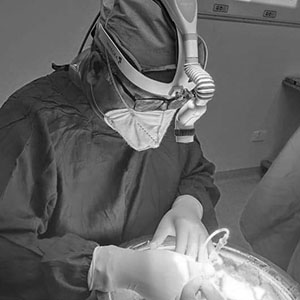Living with one kidney: The difference
Our care and support for kidney donors don’t stop after the surgery. We help kidney donors live healthy with one kidney through our donor care program with:
- Expert Team: Our Team always keeps donor health in priority. We understand donor risks and work on to improve surgical safety and hence improve long-term outcomes.
- Donor-focused care: We place donors at the center of everything we do. We strive to understand and meet kidney donors’ needs throughout the kidney donation process and into the future as well.
- Thorough evaluation: We assess your physical, social and mental health before you can donate a kidney. Ensuring you’re in best of your health before donation reduces your risk of problems during surgery, recovery and beyond.
- Support services: Our program connects potential donors with past donors for guidance and emotional support. We also offer monthly kidney transplant support group meetings for pre- and post-transplant patients, living donors and caregivers.
- Long-term follow-up: We’re always there for follow-up care and assistance for as long as you need us. You can reach us through our 24/7 patient helpline in contact us box.
Life after kidney donation: Staying healthy
After you donate a kidney, remaining kidney increases in size and function. As part of your long-term follow-up care, you need to maintain your good health by:
- Drinking plenty of water
- Eating a healthy diet
- Exercising regularly
- Maintaining a healthy weight
In addition to these, your doctor will recommend to avoid following things:
- Non-steroidal anti-inflammatory drugs (NSAIDs): These are over-the-counter pain relievers like ibuprofen, diclofenac etc. NSAIDs can damage your kidney, so it’s best to avoid them. Speak with your treating team about safe pain relievers.
- Contact sports: Sports such as hockey, football, boxing, soccer, martial arts and wrestling could injure your kidney, even if you wear protective gears. Have a word with your doctor about how to stay safe if you want to play a particular contact sport.
- High Sugar/ Salt/ Animal Protein: This kind of diet is not good for kidney in long term as they can cause Diabetes and High Blood Pressure. You are asked to modify your diet accordingly.
- Smoking: Kidneys are damaged slowly with smoking by many different mechanisms and so all donors are asked to quit smoking before donation.
Getting pregnant after kidney donation
Before donation, transplant team will discuss the risks if you are pregnant when donating. There is a risk of gestational hypertension and preeclampsia, so you are monitored closely during pregnancy. After donation, talk to your surgical team, obstetrician or gynaecologist if you are planning a pregnancy.
Routine medical care
Regular check-ups are important to monitor your kidney and overall health. Following tests are done regularly to check your kidney function:
- Blood pressure: Persistent increase in blood pressure damages the kidney, if not treated.
- Blood Sugar: This test measures sugar level in your blood. Increased blood sugar can damage your kidneys, if not treated.
- Glomerular filtration rate (GFR): This is a measure of how well your kidneys are filtering blood.
- Urine protein test: This test looks for protein in the urine. Usually, protein stays in the blood but when a kidney is damaged, proteins escape into the urine.
Recommended regular tests after surgery
- CBC, KFT, Urine Re after 3 months of Donor Surgery
- CBC, KFT, RBS, HBA1C, Urine Re, Urine ACR, USG Whole Abdomen at 1 year after surgery and then yearly
Kidney failure after donation
The risk of kidney failure after donation is extremely low If this does happen, regular follow up and timely medications keep you healthy. You will receive prioritisation for a living/ deceased donor kidney transplant.
Kidney donation follow-up care
You follow up with our living kidney donor team after surgery:
- 1 week
- 4 weeks
- 3 months
- 1 year
- 6 monthly or yearly after one year
For convenience, donors can attend most of these appointments via outreach OPD/ Video consultation (telemedicine).
Patient perspectives of living with one kidney
To better understand living donation and what life is like living with one kidney, listen our donor stories on YouTube.
Get An Expert Consultation
* Kidney Transplant
* Robotic Kidney Transplant
* SWAP Kidney Transplant
* ABO Incompatible Transplant
* AV Fistula
* CAPD Cather Insertion
drvarunmittal@yahoo.com
